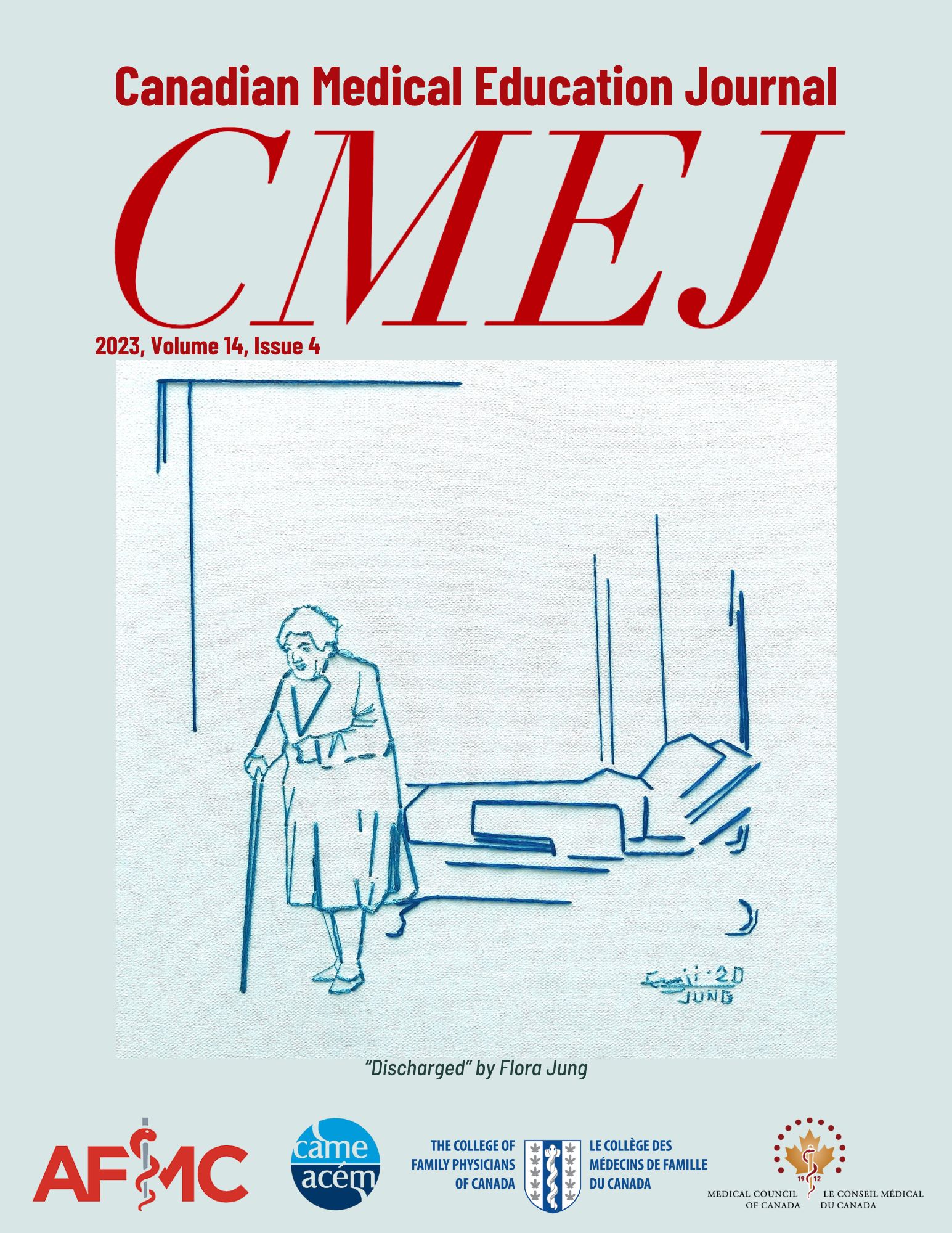Assessing commitment to reflection: perceptions of medical students
DOI:
https://doi.org/10.36834/cmej.74265Abstract
Background: While developing reflection skills is considered important by educators, the assessment of these skills is often associated with unintended negative consequences. In the context of a mandatory longitudinal course that aims to promote the development of reflection on professional identity, we assessed students’ commitment to reflection. This study explores students’ perception of this assessment by their mentor.
Methods: We conducted a qualitative descriptive study using semi-structured interviews with twenty-one 1st and six 2nd year medical students. Thematic analysis was informed by Braun and Clarke’s six-step approach.
Results: We identified four main themes: 1- assessment as a motivator, 2- consequences on authenticity, 3- perception of inherent subjectivity, and 4 - relationship with the mentor.
Conclusions: In the context of assessing reflection skills in future physicians, we observed that students –when assessed on the process of reflection– experienced high motivation but were ambivalent on the question of authenticity. The subjectivity of the assessment as well as the relationship with their mentor also raises questions. Nevertheless, this assessment approach for reflective skills appears to be promising in terms of limiting the negative consequences of assessment.
References
Chaffey L, de Leeuw E, Finnigan G. Facilitating students’ reflective practice in a medical course: literature review. Educ Health. 2012;25(3):198. https://doi.org/10.4103/1357-6283.109787 DOI: https://doi.org/10.4103/1357-6283.109787
Quinn FM. Reflection and reflective practice. In: Davies C, Finlay L, Bullman A, editors. Changing Practice in Health and Social Care. London, UK: SAGE Publications Ltd; 2000. p. 81-90.
Harlen W, Deakin Crick R. Testing and motivation for learning. Assess Educ Princ Policy Pract. 2003;10(2):169-207. https://doi.org/10.1080/0969594032000121270 DOI: https://doi.org/10.1080/0969594032000121270
Hargreaves J. So how do you feel about that? Assessing reflective practice. Nurse Educ Today. 2004;24(3):196-201. https://doi.org/10.1016/j.nedt.2003.11.008 DOI: https://doi.org/10.1016/j.nedt.2003.11.008
Grant A, Kinnersley P, Metcalf E, Pill R, Houston H. Students’ views of reflective learning techniques: an efficacy study at a UK medical school. Med Educ. 2006;40(4):379-388. https://doi.org/10.1111/j.1365-2929.2006.02415.x DOI: https://doi.org/10.1111/j.1365-2929.2006.02415.x
Trede F, Smith M. Teaching reflective practice in practice settings: students’ perceptions of their clinical educators. Teach High Educ. 2012;17(5):615-627. https://doi.org/10.1080/13562517.2012.658558 DOI: https://doi.org/10.1080/13562517.2012.658558
Bulman C, Schutz S. Reflective Practice in Nursing. 4th ed. Oxford, UK: John Wiley & Sons; 2013.
Messick S. Standards of validity and the validity of standards in performance assessment. Educ Meas Issues Pract. 1995;14(4):5-8. https://doi.org/10.1111/j.1745-3992.1995.tb00881.x DOI: https://doi.org/10.1111/j.1745-3992.1995.tb00881.x
9American Educational Research Association., American Psychological Association., National Council on Measurement in Education., Joint Committee on Standards for Educational and Psychological Testing (U.S.). Standards for Educational and Psychological Testing. Washington, DC: American Educational Research Association; 2014.
Kolb D. Experiential learning: experience as the source of learning and development. Vol 1. Prentice-Hall; 1984.
Désilets V, Graillon A, Ouellet K, Xhignesse M, St-Onge C. Reflecting on professional identity in undergraduate medical education: implementation of a novel longitudinal course. Perspect Med Educ. 2021. https://doi.org/10.1007/s40037-021-00649-w DOI: https://doi.org/10.1007/S40037-021-00649-W
Varpio L, Martimianakis MA, Mylopoulos M. Qualitative research methodologies: embracing methodological borrowing, shifting and importing. In: Cleland J, Durning SJ, eds. Res Med Educ. Wiley Online Library; 2015. p. 245-256. Available from: https://doi.org/10.1002/9781118838983.ch21 DOI: https://doi.org/10.1002/9781118838983.ch21
Sandelowski M. What’s in a name? Qualitative description revisited. Res Nurs Health. 2010;33(1):77-84. https://doi.org/10.1002/nur.20362 DOI: https://doi.org/10.1002/nur.20362
Dedoose Version 8.2. Web application for managing, analyzing, and presenting qualitative and mixed method research data [Internet]. Los Angeles, CA: SocioCultural Research Consultants, LLC; 2018. Available from: www.dedoose.com
Braun V, Clarke V. Using thematic analysis in psychology. Qual Res Psychol. 2006;3(2):77-101. https://doi.org/10.1191/1478088706qp063oa DOI: https://doi.org/10.1191/1478088706qp063oa
de la Croix A, Veen M. The reflective zombie: Problematizing the conceptual framework of reflection in medical education. Perspect Med Educ. 2018;7(6):394-400. https://doi.org/10.1007/s40037-018-0479-9 DOI: https://doi.org/10.1007/S40037-018-0479-9
Fragkos KC. Reflective practice in healthcare education: an umbrella review. Educ Sci. 2016;6(3):27. https://doi.org/10.3390/educsci6030027 DOI: https://doi.org/10.3390/educsci6030027
Law S. Using narratives to trigger reflection. Clin Teach. 2011;8(3):147-150. https://doi.org/10.1111/j.1743-498X.2011.00446.x DOI: https://doi.org/10.1111/j.1743-498X.2011.00446.x
Chambers S, Brosnan C, Hassell A. Introducing medical students to reflective practice. Educ Prim Care. 2011;22(2):100-105. https://doi.org/10.1080/14739879.2011.11493975 DOI: https://doi.org/10.1080/14739879.2011.11493975
Schaub‐de Jong MA, Schönrock‐Adema J, Dekker H, Verkerk M, Cohen‐Schotanus J. Development of a student rating scale to evaluate teachers’ competencies for facilitating reflective learning. Med Educ. 2011;45(2):155-165. https://doi.org/10.1111/j.1365-2923.2010.03774.x DOI: https://doi.org/10.1111/j.1365-2923.2010.03774.x
Downloads
Published
Issue
Section
License
Copyright (c) 2023 Joanie Poirier, Kathleen Ouellet, Valérie Désilets, Ann Graillon, Marianne Xhignesse, Christina St-Onge

This work is licensed under a Creative Commons Attribution-NonCommercial-NoDerivatives 4.0 International License.
Submission of an original manuscript to the Canadian Medical Education Journal will be taken to mean that it represents original work not previously published, that it is not being considered elsewhere for publication. If accepted for publication, it will be published online and it will not be published elsewhere in the same form, for commercial purposes, in any language, without the consent of the publisher.
Authors who publish in the Canadian Medical Education Journal agree to release their articles under the Creative Commons Attribution-Noncommercial-No Derivative Works 4.0 Canada Licence. This licence allows anyone to copy and distribute the article for non-commercial purposes provided that appropriate attribution is given. For details of the rights an author grants users of their work, please see the licence summary and the full licence.











